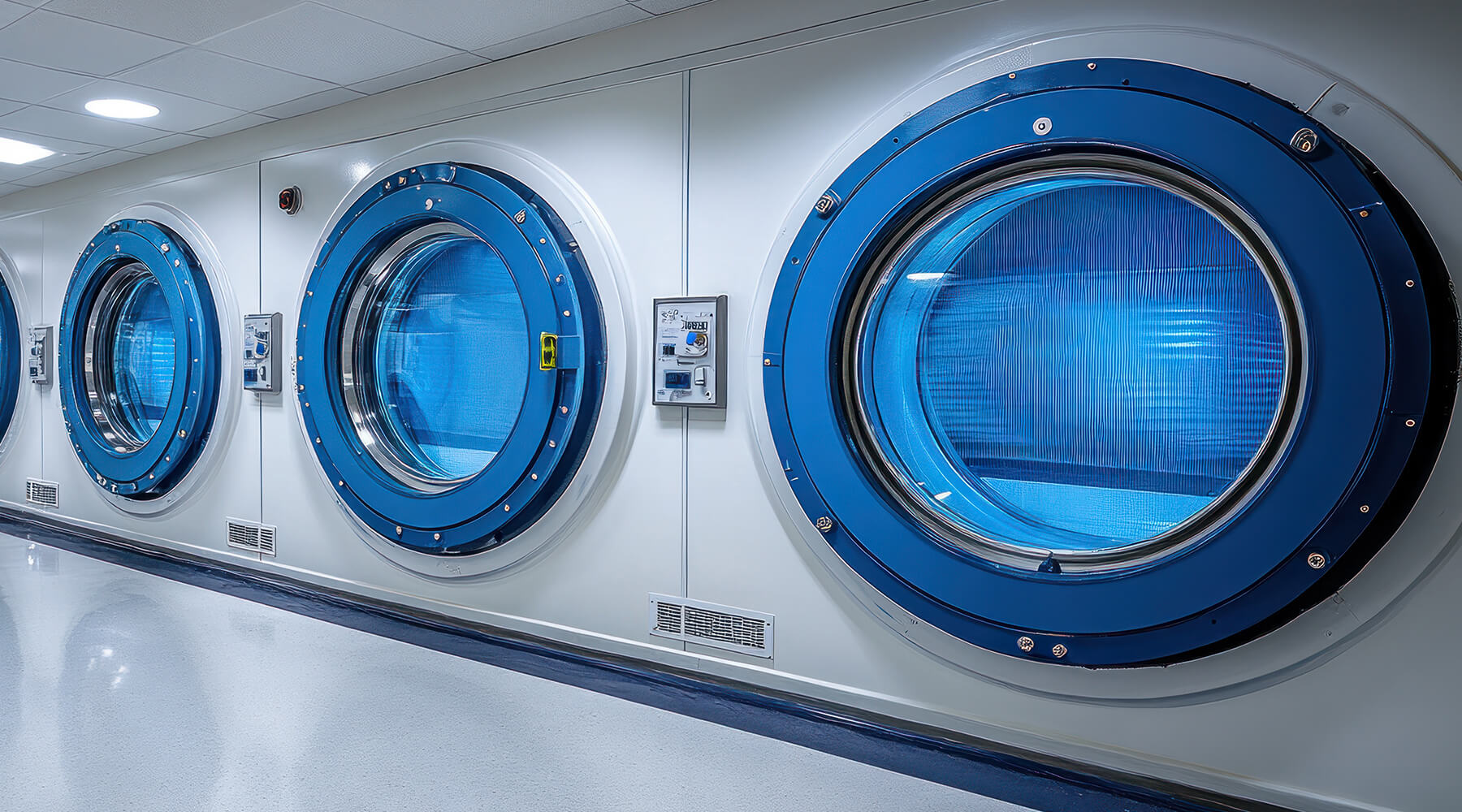Running a commercial laundry operation means more than just getting towels and sheets clean. For clinics, gyms, spas, hotels, and long-term care homes, maintaining your commercial dryers is a matter of safety, efficiency, and fire prevention. Improper dryer maintenance is one of the leading causes of laundry room fires—and in high-volume settings, even small lapses can have serious consequences.
Let’s break down the steps every facility should take to maintain safe, compliant, and long-lasting dryer systems.
Why Dryer Maintenance Matters in High-Volume Linen Facilities
In environments where towels, blankets, robes, and bedding are laundered daily, dryer performance and ventilation are critical. Over time, lint, microfibres, and residues from skin care products and massage oils can clog vents and ducts—creating a dangerous combination of flammable materials and trapped heat.
Without proper maintenance, the result can be reduced drying efficiency, higher energy consumption, and an increased risk of fire.
✅ Clean the Lint Screen After Every Load
Lint buildup is one of the most common causes of dryer fires. In commercial settings, lint screens must be cleared after every single load to maintain airflow and prevent overheating.
- Make it part of your daily operational procedure
- Post clear signage near machines as a reminder for staff
- Consider assigning responsibility to specific team members during shifts
🔧 Don’t Ignore the Dryer Ducts
Even with consistent lint trap cleaning, dryer ducts and exhaust systems are prone to buildup—especially in facilities laundering microfibre and oil-saturated linens. This buildup is typically out of sight but can be highly combustible.
Regular duct cleaning offers major benefits:
- Prevents fires by removing flammable debris from hard-to-reach areas
- Improves airflow and shortens drying cycles, saving time and energy
- Prolongs machine life by reducing internal heat strain
- Helps meet safety regulations for commercial facilities
Schedule professional duct inspections at least once per year, or more often if your laundry volume is high.
⚠️ Microfibre Shedding: A Hidden Risk
Many modern textiles—such as spa robes, towels, and cleaning cloths—contain synthetic microfibres. These particles can:
- Pass through lint filters
- Collect in vents and heating components
- Ignite easily, especially when dry
Routine vent cleaning and professional inspections are essential for any business using microfibre-based linens.
🧴 Oil Residue Can Ignite in the Dryer
Massage oils, lotions, and body butters used in wellness clinics and spas can leave residues behind even after washing. These substances can accumulate in the fabric and dryer drum, raising the risk of spontaneous combustion.
Reduce this risk by:
- Using enzyme or degreasing detergents formulated to dissolve oils
- Pre-soaking linens in hot water with emulsifiers when heavily soiled
- Avoiding overloading the dryer to ensure proper air circulation
Linens that are not thoroughly cleaned may retain oil traces that can ignite under high heat.
📅 Dryer Maintenance Schedule for Commercial Facilities
Establish a consistent maintenance plan to reduce risk and support machine longevity.
- Daily: Clean lint screens after every load
- Weekly: Wipe down the interior of the drum and check hose connections
- Monthly: Vacuum around exhaust hoses and inspect venting
- Every 6–12 months: Hire a professional to clean and inspect ducts
- Immediately: Stop use and inspect if you notice burning smells or performance issues
Final Thoughts: Dryer Safety is Operational Safety
Whether you run a rehabilitation clinic, a luxury spa, a hotel laundry, or a senior care residence, dryer maintenance is non-negotiable. It protects your equipment, your investment in linens, and—most importantly—your clients and staff.
Implementing a structured maintenance routine not only lowers fire risk but ensures that your facility continues to operate efficiently and in compliance with safety standards.
🧼 Need Help Choosing the Right Laundry Products?
We offer commercial-grade detergents, degreasers, and emulsifiers specifically suited for therapeutic, hospitality, and long-term care settings. Contact our product specialists for tailored recommendations that support both cleanliness and safety.
